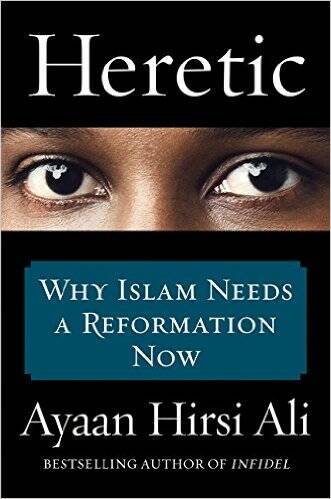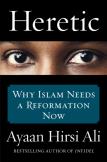At a Crossroads
Almost daily we read about atrocities carried out in the name of Islam, which raises the question: Is Islam a religion of peace and brotherhood or a system of oppression and violence that endorses beheadings, honor killings, stoning and suicide bombings?
In her urgent new book, Heretic, Ayaan Hirsi Ali argues persuasively that extremists have seized control of Islam by citing passages in Islam’s holy books that sanction violence.
Hirsi Ali grew up in Somalia as a practicing Muslim who witnessed the application of strict Shariah law. “In the public squares, every Friday, after the ritual prayers, men were beheaded or flogged, women were stoned, and thieves had their hands cut off.”
As a teenager, Hirsi Ali embraced jihad, or holy war, but eventually began to question a system that marginalized and persecuted women. When her father tried to force her into an arranged marriage, she fled to the Netherlands and later moved to the United States, where she is a fellow at the John F. Kennedy School of Government at Harvard University. She left Islam and now considers herself an atheist.
Hirsi Ali continues to fear for her life, knowing that many Muslims believe she should die because she has defamed Islam.
She advocates five reforms: abandon Muhammad’s semi-divine and infallible status; focus on life on earth instead of life after death; overhaul Shariah laws, which are derived from the Koran; review the practice of allowing individuals to enforce Islamic law; and challenge the imperative to wage jihad.
As the subtitle of this book suggests, Hirsi Ali believes that just as Christianity went through a Reformation centuries ago, Islam must do the same today.
The author sharply criticizes Western liberals who contend that atrocities like the attacks on Sept. 11, 2001, have nothing to do with Islam. Westerners wear blinders, she says, fearing that any criticism of Islam would be denounced as Islamophobia.
In a brief history of Islam, Hirsi Ali notes that Mohammad initially advocated peaceful co-existence with non-Muslims, but when he moved from Mecca to Medina, his message changed radically. Hirsi Ali says that many passages in the Quran, which Muslims regard as the final word of God, endorse violence. When Mohammad defeated unbelievers in battle, they were given the choice of conversion or death.
Seventeen Muslim-majority nations declare Islam the official state religion and require that the head of state be a practicing Muslim. Many Muslims reject any notion of separation of mosque and state.
The Quran stresses the importance of the afterlife. Children are taught that they will go directly to heaven if they die as martyrs in suicide attacks. Parents express pride in children who end their lives on suicide missions. Hirsi Ali describes a Palestinian woman who encouraged three of her sons to become suicide bombers against Israel. “Mothers of suicide bombers talk as if their sons had gone off to get married.
The author cites passages in Shariah law that authorize beheadings, crucifixions, amputations, stoning and lashings. At least 15 Muslim nations allow or require death by stoning for adultery or other sex-related prohibitions. After Friday prayers in Saudi Arabia, men flock to nearby squares to watch the implementation of Islamic justice by cutting off hands, stonings and beheadings.
In the Middle Ages, Catholics launched the Crusades and burned heretics at the stake. While this violence is part of church history, similar atrocities occur today in Muslim nations.
Hirsi Ali expresses outrage that Muslim women are treated as second-class citizens. Men may take up to four wives, while women are limited to one husband. “The inequality of the sexes, in short, is central to Shariah.”
At least 5,000 women are put to death in so-called honor killings each year. The author cites the case of a 25-year-old Pakistani woman who married against her father’s wishes and was then stoned to death outside a courthouse.
Hirsi Ali previously wrote Infidel, a best-selling memoir of her early years. Next, in Nomad, she described her efforts to build a new life. Now, in Heretic, she says an Islamic reformation is possible, although the evidence she cites belies her optimism.
The author is on solid ground when she writes that the West has spent trillions of dollars waging war against terrorism without much success. She argues that Western nations need to fight ideas with better ideas, not with bombs.
“Islam is at a crossroads,” Hirsi Ali argues. “Muslims…by the tens of millions and eventually hundreds of millions, need to make a conscious decision to confront, debate, and ultimately reject the violent elements within their religion.”
Heretic is not light reading. Many will likely feel revulsion at the extreme punishments and slaughter carried out in the name of Islam, with suicide bombers shouting, “God is great.”
The questions raised in this provocative book deserve a wide readership, especially at a time when radical Muslims are actively recruiting suicide bombers in the United States and Europe.
This article also appeared in print, under the headline “At a Crossroads,” in the October 19, 2015, issue.








